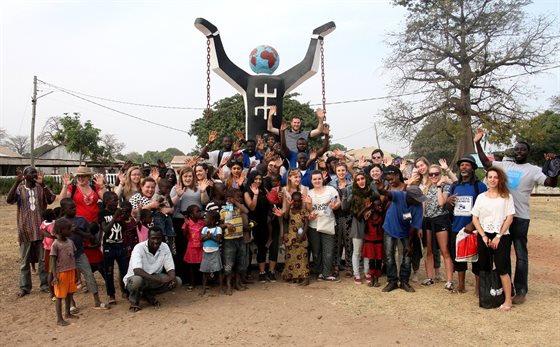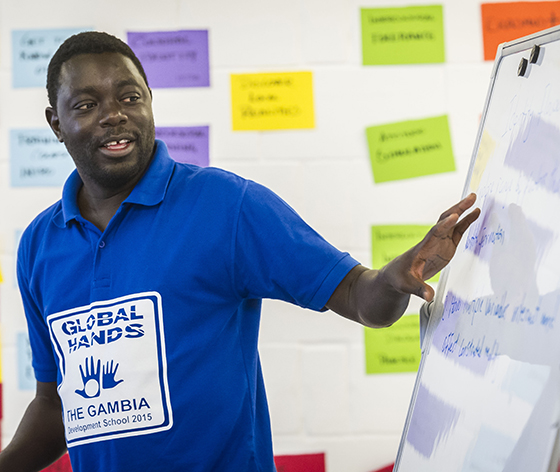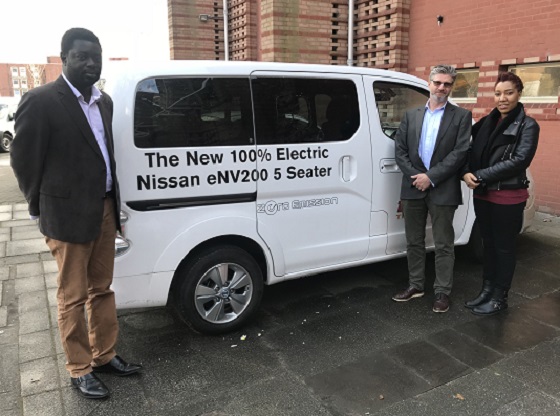Young Gambians rebuild their lives with help from DMU
Staff and students at De Montfort University Leicester (DMU) are helping young people who have returned to The Gambia to integrate back into their communities, after they risked their lives trying to migrate to Europe.
Since 2017, more than 3,000 youths have been sent back to The Gambia, after attempting to reach Europe via the difficult and dangerous ‘backway’ through Libya.

DMU staff and students visit The Gambia every year
Many have experienced serious hardships, including being imprisoned in Libya and seeing their companions murdered or tortured, and when they return home there is limited support available to help them rebuild their lives.
However, Global Hands – a not-for-profit organisation set up by DMU staff and students to tackle inequality through community engagement – is working in the country to support young Gambians to develop new skills and plan for their future.
Global Hands is a registered charity in The Gambia and also a social enterprise in the UK.
“These young people have no hope. They believe the only way they can make something of themselves is to go to Europe on a dangerous route through the Sahara Dessert,” said Dr Momodou Sallah, Global Hands founder and Reader in Globalisation and Global Youth Work at DMU.

Dr Momodou Sallah founded the Global Hands organisation
“We have heard some horrific stories of pain and suffering from those who attempt to migrate through the backway. People are being sold into slavery for $300 or being used for illegal organ transplants. It’s hard to believe this is actually going on – but it is.
“As a result, a lot of the people who later return to The Gambia are affected by psychological trauma. They feel like failures.”
To raise awareness of this ongoing issue, Dr Sallah – who is also the Director of DMU’s new Centre for Academic Innovation (CAI) – has co-produced a short film called ‘The Way Back: Life after the Backway’.
The documentary, shot by filmmaker and former DMU student James Skinner, follows youth activist Mariama Samba as she speaks with those who have returned to The Gambia, as well as their families and the agencies which are providing support.
Dr Sallah has worked in The Gambia for more than two decades and every year he organises trips for DMU students to get involved in major community projects out there.
In 2015, Global Hands opened a ‘Development Hub’ in the village of Manduar, providing accommodation facilities for 35 people, as well the Global Hands library and a ‘living lab’ for engineering innovation and building capacity.
“Our work is about giving Gambians and other parts of Africa hope and giving them something to believe in,” said Dr Sallah. “We’ve built one of the largest libraries in The Gambia and we also supplied Africa’s first solar-powered taxi. Our hub is about innovation, co-creation and disruption.”

Global Hands supplied the first solar-powered taxi in Africa
Global Hands will be providing skills-based courses at the hub from September in subjects including catering, tailoring and film production.
“We want to focus on skills development and entrepreneurial knowledge so that these young people can set things up for themselves,” said Dr Sallah.
“Our work in The Gambia is also linked to the United Nation’s Sustainable Development Goals (SDG) – we are developing sustainable development outputs, especially around housing and food security in the country.”
RELATED NEWS
Academics put the sun to good use with Africa's first solar taxi service
DMU staff donate books and computers to help communities in The Gambia
Musicians to perform new single at DMU highlighting plight of young Gambians
As the lead higher education institute in the UN’s ‘Together’ campaign, DMU is committed to supporting the UN’s SDGs, to ensure all people enjoy peace and prosperity by 2030.
DMU encourages students, alumni and partners in universities and organisations around the world to address these 17 goals through pioneering research, community work and academic excellence.
Posted on: Wednesday 31 July 2019